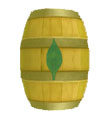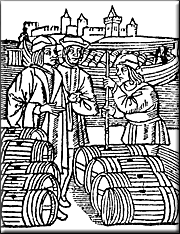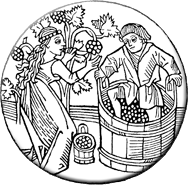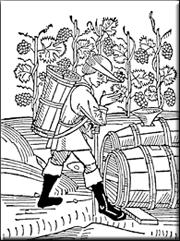Brewers' Frequently Asked Questions
- "What is the purpose of the Brewers' Guild?"
- "How do I join the Brewers' Guild?"
- "Does the Brewers' Guild have a badge?"
- "Does the Brewers' Guild have a Ranking System?"
- "Can Brewers unable to attend Crown events participate in competitions and earn ranks?"
- "How can I learn about period brewing?"
- "Does brewing require complex and expensive equipment?"
- "Is it difficult to brew?"
- "Where can I find period recipes?"
- "How do I write up documentation for a competition?"
- "How does one compete in a Brewing Competition?"
- "Who judges a West Kingdom Brewing Competition?"
- "What do the judges look for in a brewing competition?"
- "I don't want to compete. Can I still get feedback on my brew?"
- "Where can I get info on upcoming competitions?"
- "Who are the current contacts for the Brewers' Guild?"
- "Is it spelled Brewers Guild, Brewer's Guild, or Brewers' Guild?"
- "Where can I find period recipes?"
If you have a query that is not listed here, please Contact Us for assistance.
1. Purpose of West Kingdom Brewers' Guild
The purpose of the guild is to encourage the practice, research, and understanding of brewing, and particularly, to understand the types of brewing practiced during the SCA period. We want to be a resource for both the beginning and the advanced brewer, and an exchange through which brewers can share information and techniques.
2. How To Join West Kingdom Brewers' Guild
Come to meetings and participate! Take classes, participate in tastings, go to the meetings at Crown events. The newsletters are available online right here at the new West Kingdom Brewers' Guild Site.
If you would prefer to receive the newsletter as an email--provide the Chronicler with your email address.
The Guild badge is as follows:
"Fieldless, A tun palewise Or charged with a laurel leaf vert."
The tun, as generally depicted, is a wooden barrel. Anotherwords, a golden barrel with a green laurel leaf, displayed vertically in the middle of the barrel, without a background. The field is used to indicate ranking within the guild.

There is no requirement to participate in this system, although many people enjoy doing so. Rank is displayed by changing the badge’s field color. The requirements for the rankings are as follows:
Apprentice - Anyone who wants to play and participate in the Brewers’ Guild activities. (Is entitled to wear the Guild badge on a green field.)
Journeyman - Someone who is proficient in at least one style of brewing and has performed at least one public service work. (Is entitled to wear the Guild badge on a blue field.)
Craftsman - Someone who is proficient in at least two styles of brewing, and had performed at least three public service works. (Is entitled to wear the Guild badge on a red field.)
Master Brewer - To achieve this rank you must have attained the previous rank of Craftsman, be nominated by your fellow Craftsmen, and be approved by the other Master Brewers. (Is entitled to wear the Guild badge on a purple field.)
Definitions:
Style - Beer, wine, mead, cider, cyser, cordial, or non-alcoholic beverage.
Public Service Work - Teaching a workshop, submitting articles or art to newsletters, holding a contest or tasting, judging a competition, helping to host the A&S tent when it is our turn, helping to run the Silent Auction, supplying brew for taxes at 12th Night, etc.
Proficiency - Competency in a style, as judged by fellow brewers from a sampling of at least three different brews.
Brewers in the more distant regions of the Kingdom may achieve awards up through Craftsman by participating in their local events. Such individuals should make sure that their activities are reported to the guild by their area representative. Individuals may also send brews to Crown events to be judged or tasted. They will receive feedback about their brews.
The two easiest ways to learn about period brewing are to take classes at A&S and Collegium events and to read the Brewer’s Guild Newsletter.
SCA brewing classes provide basic instruction in the types of beverages that were popular in various areas of Europe and the Middle East and how they were made. Some classes will focus on a specific style of brewing, such as Mead or Ale and some are more generalized, such as "Brewing Utensils and Techniques" or the "History of English Ales."
Period recipes are often provided as part of the class handouts. Period recipes and sources for period brewing information and ingredients are also frequently included in the newsletter.
Many of us started brewing using an old stainless steel stockpot and regular kitchen utensils. As you begin to brew on a regular basis, you may choose to purchase larger pots and utensils which are used only for brewing. But, this is not necessary as long as you are careful to sterilize all of your equipment before you brew or bottle.
Peasants brewed successfully every day. In many countries brewing was a regular household chore that women did. It was considered to be trivial and unworthy of documentation. If you can follow a recipe you can brew. Other than that the most important considerations are the quality of your recipe, the quality of your ingredients, and cleanliness.
The easiest way to acquire period recipes is to take SCA brewing classes or read the Brewer’s Guild Newsletter. If you desire to go beyond these sources, the newsletter regularly includes information on period sources for recipes.
Several brewing recipe sources that are period, or just slightly post period have been reprinted in book form. The two most commonly available examples are The Goodman of Paris (1393) and The Closet of Sir Kenelm Digby (1669).
Another type of book which can be helpful, especially for the beginner, are books which collect recipes from original sources and convert them into modern recipe form. The most commonly available book in this category is A Sip Through Time by Cindy Renfrow. These books can sometimes be obtained through vendors at Crown or Principality events.
Keep it simple. You do not need to write a major paper. One or two sheets of information is sufficient.
We want to know what source you used for your recipe. If possible, we prefer a period source, a copy of the actual recipe, your translation and redaction of the recipe and what procedure and ingredients you used to produce the brew. If you want to include other historical information after this, you may. Beware of relying on generalized sources, such as encyclopedias or popular books that do not give accurate documentation of their sources.
Please be sure to let us know if you have used any preservatives, such as Campden tablets in the production of your brew. Campden tablets leave residual sulfites in the brew, which can make some people very sick.
Please be aware that documentation does count towards your competition score. In the case of two brews of equal quality, the one with the best documentation receives the higher score.
Deliver your documentation and a standard brown beer bottle containing your brew to the Brewer’s Guild Pavilion by the deadline set to enter the competition.
While we prefer that entries do not have an identifiable label, it is not necessary to remove your labels. We may choose to cover them.
You should sign in and provide your information on the competition list.
The details of the pavilion location and the deadline will be announced in court. They are also posted on a whiteboard at the A&S pavilion. Competitions are usually judged during the afternoon and the results announced in evening court.
The judges are usually made up of Craftsman and Master brewers from the Brewer’s Guild. These are all people with extensive brewing experience. Beginning brewers can often have the opportunity to taste various brews and hear them discussed during the regular meetings.
Each brew is judged on several factors.
The Documentation. Is it complete? It should show where you got the recipe, what the recipe is, and the procedure that you used for making the brew.
The Brew. Does the brew have a good color? Is the color appropriate for the type of brew? If the brew is supposed to be clear, is it? If it is not supposed to be clear, is it? How is the nose? How is the flavor? Good start? Good finish? Aftertaste? Offtaste?
We also grant points for appropriateness for the competition.
14. Feedback Outside of Competitions
Any individual can bring their brews to a Brewer's Guild meeting. The brews will be shared and the brewer will receive feedback about their brews. The Brewer can ask questions about brewing techniques, problems, etc.
We always try to offer information that will help both new and old brewers improve the quality of their brews. This is also a great way to taste various sorts of brews that you are considering brewing and meet other people who are interested in brewing.
If you have a brew that is not successful, be sure to share this information with us, too. A lot of times we are able to offer suggestions on how to avoid future problems. Also, if you have a brew that doesn’t taste great, ask someone about it before you toss it out. Assuming that it is not spoiled, it may simply need to age for a longer time. Some brews, particularly mead, cyser, and wine, are often at their best after a year or more of aging.
The competition schedule is published in The Page and in every edition of the Brewers' Guild Newsletter, Brewing News.
Principality competitions are also listed in the Newsletter.
The competition schedule will always be on the Brewers' Guild website when available.
Guild Chancellor
Peyre de Barat
lordpeyre@yahoo.com
Cynaguan Representative
Baron Johann von Drachenfels
jlatorre@midtown.net
Mists Representative
Vacant
Oerthan Representative
Vacant
Chronicler for the Guild
Aeschine Colquhoun
aeschine@meowzettes.com
Guild Web Minister
The Chronicler's other hat. ;)
No Calls After 9PM Please - The Yeasts Are Sleeping.....
17. Correct Spelling of our Guild
It's spelled "Brewers' Guild", because it's possessive plural. "Brewer's" is singular, and there is, after all, more than one brewer in the Guild. "Brewers Guild" would just be incorrect.
18. Where you can find period recipes
The Medieval/Renaissance Brewing Homepage
Stefan's Florilegium (When you get there, just follow the link on the left to beverages)



